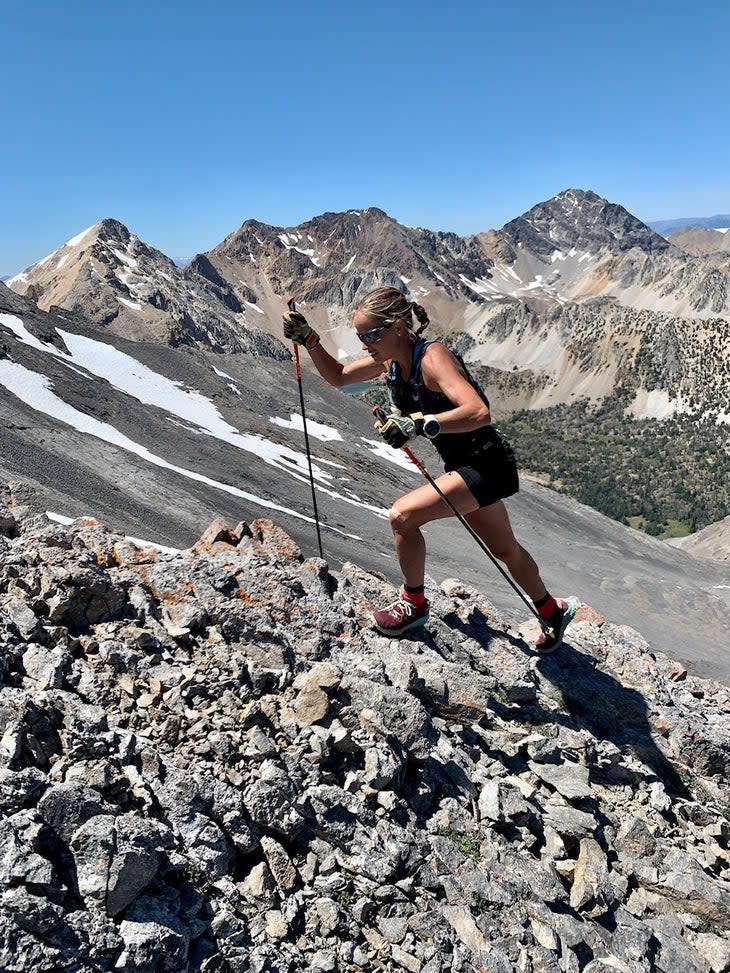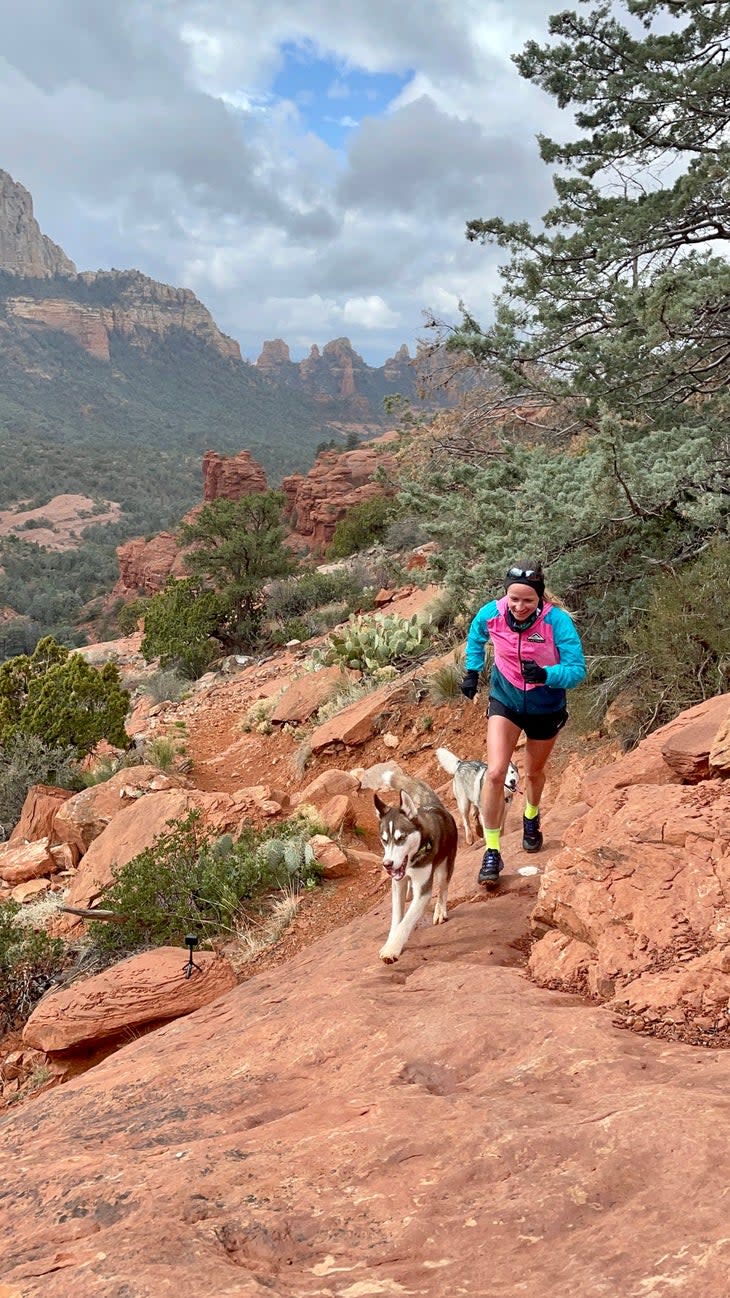How Brittany Peterson Balances Pro Running With Her Work As A Mental Health Educator
This article originally appeared on Trail Runner
*May is Mental Health Awareness month. At Trail Runner, we want to normalize and destigmatize mental health care and promote compassion in the trail community. If you are interested in learning more or seeking help, you can connect with Bigger Than The Trail on their website. If you or someone you know needs immediate assistance, call the National Suicide Prevention Lifeline at 800-273-8255.*
Brittany Peterson has one of the more illustrious resumes in American trail running: with wins at the Moab Red Hot Ultra, Scout Mountain Ultras, Bandera 100K, and Black Canyon 100K, plus two top-five finishes at Western States and the sixth-fastest women's time ever on that course, she's no stranger to athletic success.
But for Peterson, whose accolades really started accumulating after she graduated from college and made the switch from the track to the trails, balancing success with the pressure that comes from it has been a journey she didn't expect.
"I wasn’t anything good in college athletics. But I think it helped me with my identity and [helped me] find my people, my group of friends, and where I fit in," she remembers. "And I was running, having some success racing, but nothing on the scale I am right now. And I would have injuries or whatever and then get all wrapped up...Running was intermingled with my self-worth and my identity, and it’s something I’ve been really conscious of."
Being an incredible athlete is something Peterson balances with her academic calling of occupational therapy. When she's not setting FKTs or racing the world's most famous ultras (she's set to return to both Western States and UTMB this year), Peterson is an instructor of occupational therapy at Idaho State University in Pocatello. Her professional and academic work have provided retrospective insight into her struggles during college, and still influence how she sees her running today.
"There has been a soft spot for [mental health] my whole professional life," she says. "But then as I’ve discovered more and learned more about my adult self, probably because I have my own depression, I think it’s kind of twofold with my personal experience. I’m hard on myself, I’m a perfectionist, all those things that lead toward problems if you don’t address it or figure it out or talk about it, at least."
Peterson has now been teaching for over four years, and, while she loves both the athletic and academic parts of her life, there is sometimes a lurking question in the back of her mind that impacts so many of us: would I be more effective or find more success if I just focused on one thing?
RELATED: Mental Health Is Health. Let’s Treat It.

She had the chance to fight that mentality in April, when she raced the Canyons 100K and ultimately came away with a DNF. Having to abandon a race can be an especially taxing experience on mental health, particularly if your primary metric for success is race results. But Peterson tried to prepare for the possibility of "failure" ahead of time.
"It’s been a good reminder of one of the meditations that I listen to," she says. "It’s an athlete-specific one. It said something about, 'if you fail, it’s not a failure if you gave it your best.' It’s always a good perspective. It’s a race. If it doesn’t go well, life goes on and it’s OK. But it’s an opportunity to go and test yourself, which is always fun."
Running and racing – especially when they come with some measure of success – can act like both a form of therapy and an addictive substance at the same time. Sport allows us to connect more fully with our bodies and minds, but if we come to rely upon it as our source of external validation, it can make races that don't go to plan feel that much more devastating.
"I think there’s a lot of people where running can be our substance, essentially," says Peterson. "There’s a lot of people that have found running and it has turned into their therapy, their rehabilitation, their path toward sober living. And then I look at myself. There’s times where I’m like, 'I love this sport and I love running,' but sometimes it [has] the opposite effect of pressure and results and how that works towards your self-worth."
"I wish you could see yourself as I see you."
While it can be challenging to get out of your own head, to decouple race performances from self-worth, Peterson says that having the right people around her has helped a lot with that. She recalls an instance where a friend once got emotional, saying, "I just wish you could see yourself the way I see you." In focusing solely on athletic performance, Peterson found herself neglecting all the other worthy and wonderful parts of her character.
"I just think everyone needs to have that message in their life from hopefully as many people as possible, but from their closest people," Peterson says. "What you achieve, no matter what it is... it’s not important in the big run. Really finding that way to see you as other people see you is super important."
RELATED: How One Trail Runner’s Journey Made Space For Mental Health In The Endurance Community

In addition to her academic work in occupational therapy, Peterson is an ambassador with the nonprofit, Bigger Than The Trail, which aims to increase awareness, decrease the stigma around mental health care, and provide free access to mental health professionals to individuals across the trail community. She's also found that reading other perspectives on mental health has helped open her mind up to seeing herself as a complete person, not just an athlete; she cites The Happy Runner by David Roche and Dr. Megan Roche and The Passion Paradox by Brad Stulberg and Steve Magness as particularly influential books in her mental health journey. She also keeps a journal to process her thoughts and emotions.
She has many, many miles left in her running career, but one of the takeaways that's been most powerful for Peterson sounds simple and blunt, but it allows her to let go of much of the comparison inherent in sport: life is more than running.
"It’s cool to be able to use your athletic gifts to touch other people in a more meaningful way than 'so and so won this race.,'" she says. "I look at these students, where they’re crippled with anxiety and perfectionism. I think I see my former – well, probably my current – self.
"One thing that I’m super excited about with my position is through my running, I get to show them balance in life, and relate with people that are definitely along the same line as me, working to prove that you’re good enough, and try to stop that thinking...or at least provide an example. You are doing amazing. You have what it takes."
RELATED: Jacob Puzey Reflects On The Pandemic, His Brother’s Cancer Journey, And Mental Health
Reagan Colyer is Trail Runner's assistant editor and gear editor. She lives in the Northern Rockies of Montana, fuels her runs with scones, and prefers to race in cold, rainy conditions.
For exclusive access to all of our fitness, gear, adventure, and travel stories, plus discounts on trips, events, and gear, sign up for Outside+ today.

